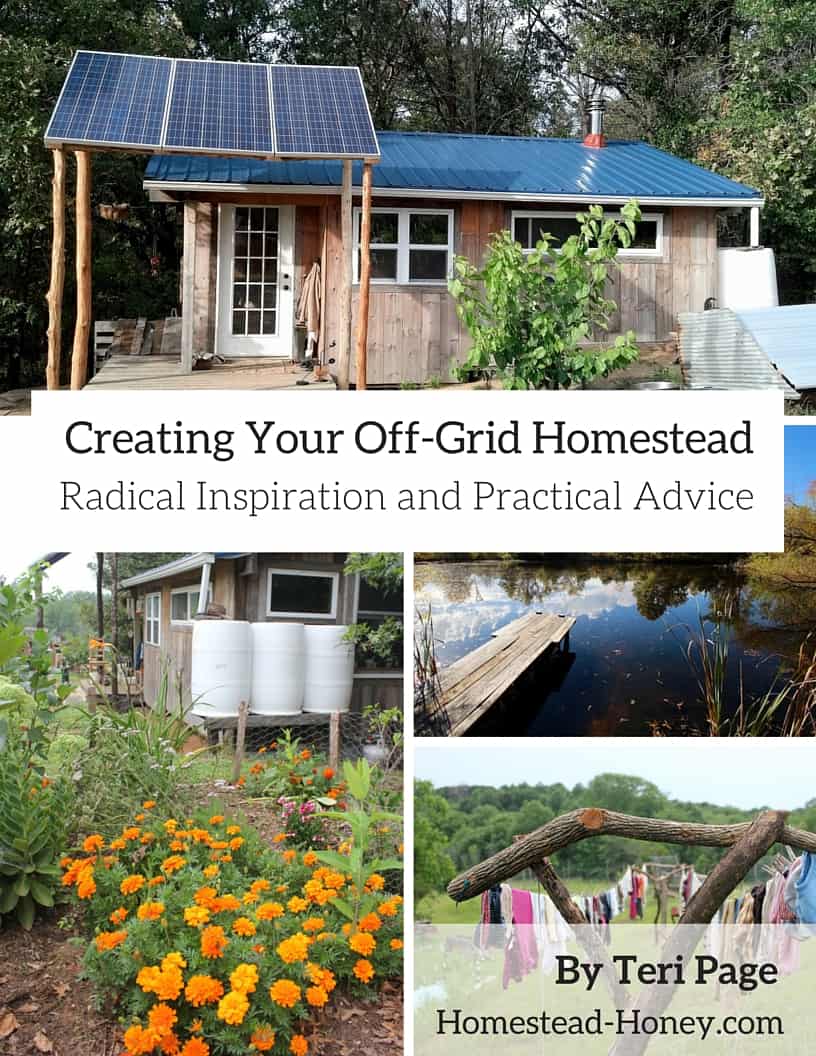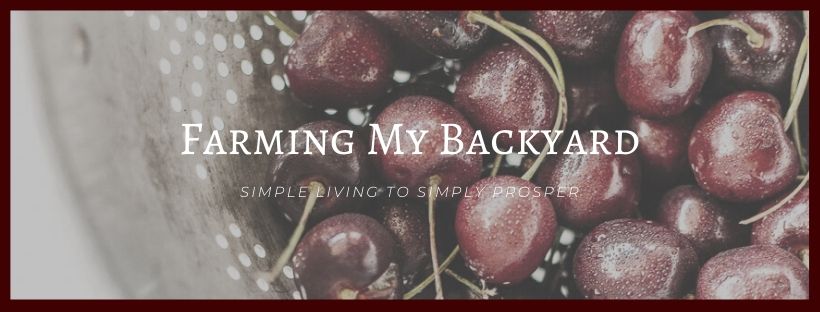A few years ago I had grand visions of selling our house in the city, building a tiny house for my husband and our two children. The ultimate dream was to be off the grid, completely self sufficient, homesteading, and raising all our food. In an effort to start living as off grid as possible I experimented with cooking on a rocket stove, line drying, hand washing the laundry and even composting toilets. A few years (and two kids) later I realized that as much as I loved the idea, it just wasn’t the right choice for our family.

Around the same time that I was looking into all of this and experimenting from the safety of our ON grid house Teri over at Homestead Honey was DOING IT FOR REAL. I have to admit I was (am…) a little jealous but I’m also super-duper excited for them. I’ve done enough hand washing and urban homesteading to know that going off grid isn’t easy. It takes hard work, determination, and knowledge of what you are doing.
I was pretty curious when I saw that Teri had made a downloadable e-book called Creating Your Off Grid Homestead and she was gracious enough to gift me a free review copy.
Do you want to live off the grid?
Maybe living off the grid IS the right choice for you and your family. Maybe you’re already living it! That’s awesome! (I’m jealous)! But maybe you are still living in the city, biding your time before you get off the grid. Even if the time isn’t right to make your move, there are things you can do RIGHT NOW to get yourself ready so that you have the skills you need when you can start your off the grid homestead.
Read books!
Ever heard of the term armchair philosopher? Well, the perfect way to get your feet wet with off the grid living is sitting in a comfy chair reading a book. There are quite a few helpful resources out there when you look for specific topics. Start reading about rainwater harvesting, setting up solar panels, cooking from scratch, or growing your own food, or other useful topics.
In addition to skill specific books, it’s also a good idea to include books that have more of an overarching view of how to put it all together. Creating Your Off Grid Homestead covers everything from choosing property, building a shelter, and building an off grid kitchen. Each section has questions you should ask yourself before you get started building your off grid homestead.
Each chapter has subsections with details about things like laundry, internet, animals, bathing, living off grid with kids, and setting up water catchment and solar systems. You can check out the table of contents, pictures, and sample pages here. The biggest downside is for those of you who prefer paper copies of books as this is only available as a digital download.

Learn A New Skill
And then another, and another after it. But take it one at a time so you don’t overwhelm yourself. Chances are if you’re off grid, electricity may be somewhat limited. A great first skill to learn is how to hang up your laundry to dry. It’s easy and requires nothing more than a bit of rope to start. If you decide you really hate it, you haven’t made any big commitments or spent much money. You’ll even save some money too! Getting in the habit of reducing your electricity use now will help the adjustment be not so overwhelming when you start living off the grid.
Read More: How To Line Dry Clothes Indoors When Your Dryer Is Being Stupid, 17 Ways To Save Electricity (And Money Too!), and What To Do When You Have No Refrigerator
Try Out Composting Or Even A Composting Toilet!
Part of being off grid is managing your garbage and other outputs. Composting is easy to start and set up even in a very small space. There are worm composting bins that can even be used in an apartment. Start learning how to compost NOW so if you make a mistake you won’t have garbage piling up and no way to haul it off.
Also, septic tanks can be expensive to set up. If there’s a possibility your homestead won’t have indoor plumbing make sure you’re okay with the alternatives. Take some time to read the Humanure Handbook, and maybe give a composting toilet a whirl. Make sure it’s something you can live with BEFORE you commit!
Read More: How NOT To Compost, 16 Ways To Screw It Up, and How To Make Your Own DIY Composting Toilet
Conserve Water Now
Moving off the grid means that most likely you will be using well or rain water. Neither of those are endless sources of water, and it’s a good idea to learn to conserve water in your home now. Learn how to set up and maintain a rainwater catchment system, as well as basic ways to store water in the earth such as hugelkultur beds, swales, and rain gardens. By setting these systems up on a small scale first, you’re inevitable mistakes will be much smaller and less expensive than if you are experimenting for the first time while living off grid.
Read More: 20 Ways to Save Water and Cut Down Your Bill and What are Hugelkultur Garden Beds?
What is being off grid really like?
One of the things I really appreciate about Creating Your Off-Grid Homestead, is its honesty about what is entailed in living off the grid. I also loved it that Teri talked about some of the things they found that they really missed and wanted to have, like hot showers, electric lights, and internet. My own family is much happier when we have them! Everyone has things they would prefer not to live without. I love it that she was honest about those as well as the good, exciting parts of being so self-sufficient.
Take a step in the right direction
Building an off grid homestead from scratch is not the right thing for my family. Maybe it’s not the right thing for yours either. Even if you know that already, there are still steps we can take in our city homes to become a bit more self-sufficient. Creating Your Off Grid Homestead is a good jumping off point for that too. I’ve always dreamed of setting up solar panels, but it seems so very overwhelming. After reading the details of their solar panel system I have a much better grasp on what it entails. I still would like to add solar to our homestead eventually.
Maybe going off grid and living off rainwater catchment isn’t a possibility in your area. You could still set up a robust rainwater system to use in irrigating your garden and yard. Perhaps you have room to include a root cellar on your property or home, or want to install a wood burning stove (we loooooove ours!), or start cooking with a sun oven. Maybe you are intrigued by the idea of cutting down your ecological impact, but didn’t even know those options were out there. There are things you can do not matter where you live!
We can’t all be as courageous as the Page family to create our own off grid homesteads, but we can still learn from them. Let’s work together to make the world a little better.

Want To Raise Happy Chickens?
Subscribe for our newsletter and get the free email course Intro To Backyard Chickens as well as a free printable checklist to walk you through step by step!
